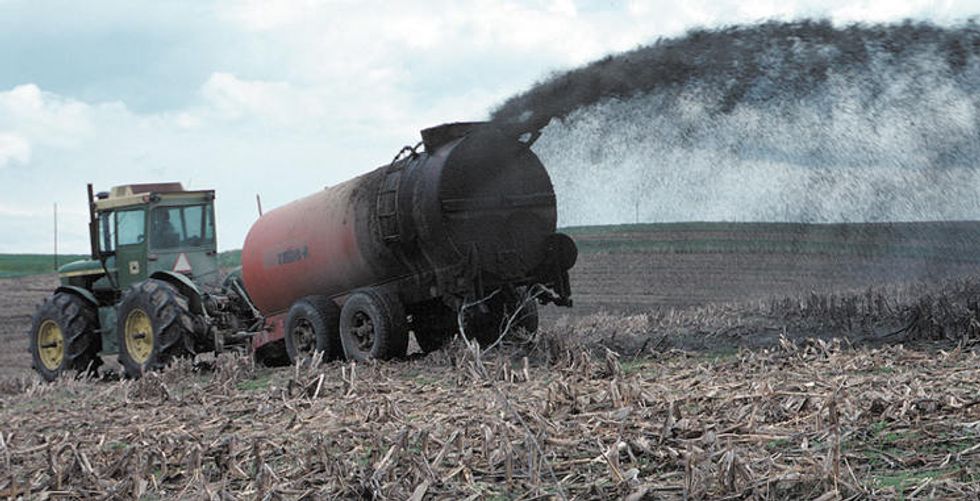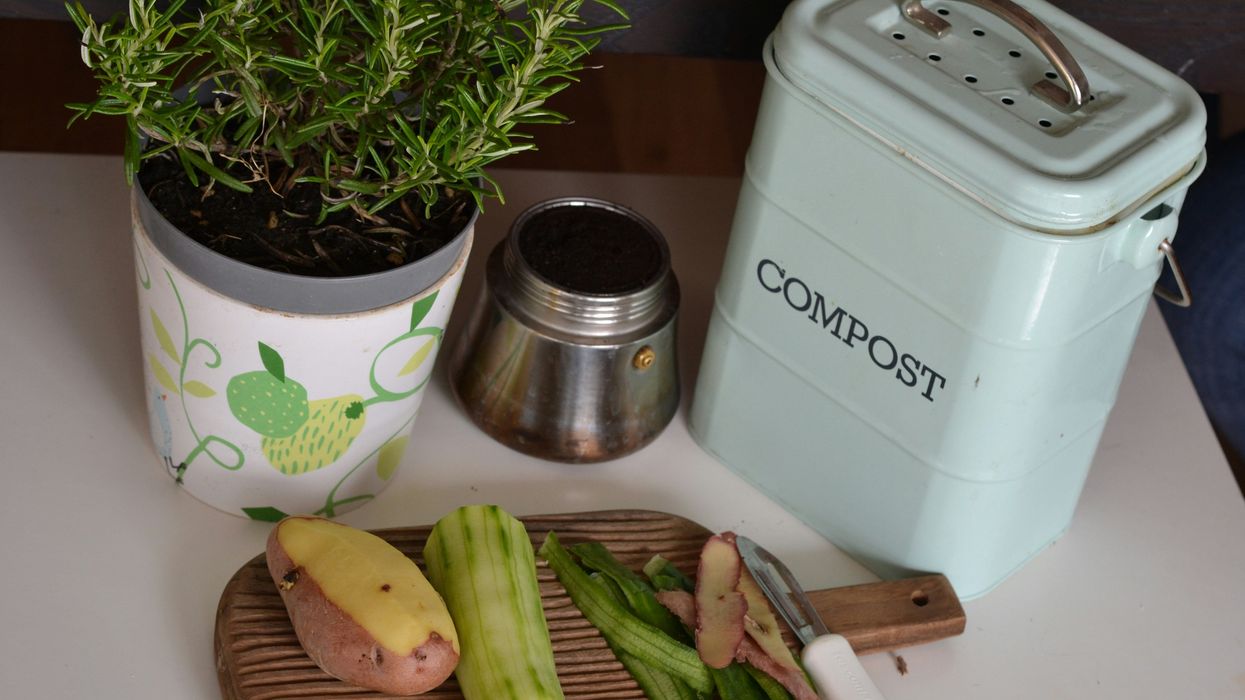One Saturday in the mid-1990s, Elsie Herring was sitting on her mother's screened-in porch with her family, "enjoying being outside, as we had done for years," she says.
Meanwhile, Herring noticed a neighboring hog farmer bring his tractor and manure sprayer to an adjacent field.
"Just as I was thinking to myself that there was no way that he would begin spraying so close to us, I heard a bursting sound," Herring, who is African-American, recalled in a deposition.
The sprayer began to pump waste toward the Herrings. "We had to scramble to get out of the way. The waste had this terrible, raw, stinking odor that we had never before experienced," Herring says.
The spraying continued. Hog waste blew onto the side of the house. "If the windows were open," Herring says, "the waste would have landed in the house."
That Saturday was the beginning of the family's decades-long fight against the industrialized hog farm.
Herring is among more than 500 residents in eastern North Carolina who are suing Chinese-owned pork producer Murphy-Brown in 26 nuisance lawsuits. The complaints allege the odor from the lagoons and the manure spray fields, and the flies that come with it, have degraded the residents' property values and quality of life.
But legislation recently passed in North Carolina could undercut these lawsuits and keep them out of the courtroom. And North Carolina isn't alone: Right to Farm laws, which limit nuisance claims, have been passed in all 50 states. Agricultural states, such as Iowa, Texas and North Carolina, have some of the strongest statutes that favor corporate-owned farms.
Nationwide, the consolidation of the livestock industry and corporate political power has created a formidable proponent of anti-nuisance laws. As a result, neighbors of these industrialized farms who have taken on the hog industry are seeing their nuisance claims gutted, with few avenues of recourse.
Avenging losses

A manure spreader applies waste to a farm field. (Credit: Johns Hopkins University)
Even 400 years ago, the stench from hog farms was considered a nuisance. In William Aldred's Case, filed in England in 1611, the Court of the King's Bench ruled that "an action on the case lies for erecting a hogstye so near the plaintiff that the air thereof was corrupted."
Fast-forward several centuries. There are a lot more hogs. The number of swine raised and sold in the United States has increased 25 percent from 2007 to 2012, according to the latest figures available from the U.S. Department of Agriculture census. But the number of farms has decreased 29 percent over the same period, a result of the consolidation of family farms into larger enterprises that are in the hands of a few conglomerates.
As production has grown and consolidated anti-nuisance laws have proliferated as an outgrowth of Right to Farm Acts—passed in some form in every state since the 1980s. Although the content of these statutes vary, many did not originally prohibit nuisance lawsuits.
Over the past 15 years the American Legislative Exchange Council—a coalition of conservative politicians and large corporations and interest groups, including the National Pork Producers Council—has drafted model anti-nuisance laws for states to use. Some states, such as Arkansas and Indiana, have adopted them nearly verbatim.
Agricultural legal experts say that states have generally tightened anti-nuisance laws after a farm or company loses a court case. These initiatives have taken the form of right-to-farm acts, legislation designed to limit recovery of damages in nuisance actions, and even constitutional amendments, according to Cordon Smart, who last fall wrote an historical analysis of the Right to Farm Act in the North Carolina Law Review.
As the livestock industry has consolidated, nuisance suits are targeting primarily the behemoth corporations that contract with local farmers. And these corporate owners have immense political power to convince state lawmakers to pass legislation favoring them.
For example, in 2010, a Missouri jury awarded neighbors $11 million in a nuisance suit against Premium Standard Farms, a subsidiary of Smithfield Foods. Shortly afterward, the Missouri legislature capped the damages that could be recovered in nuisance suits to the fair-market value of the affected property, according to the legal journals compiled by the National Agricultural Law Center.
In many instances, these laws are used to thwart pending cases. For example, in Texas, plaintiffs who lose their cases have to pay defendants' attorneys' fees if the suits are deemed frivolous.
The top pork-producing state in the nation, Iowa, is also a legal minefield for agribusiness, farmers and their neighbors. At least 24 nuisance suits — 21 involving hog farms — have been filed since 1990, with payouts exceeding $1 million in compensatory damages for pain and suffering.
Iowa has since amended its Right to Farm law to immunize farms against nuisance suits if they are located in an area zoned agricultural. And like North Carolina, its statutes have capped damages for pain and suffering, and prevented multiple lawsuits from being filed against a single operation.
Iowa law provides nuisance suit immunity to farms that operate by "industry standards," which are open to definition. And now suits generally can't be filed to pre-empt the construction of large operations.
Andy Curliss, executive director of the NC Pork Council, says farmers prefer to stay out of the courtroom altogether. "We continue to believe that any concerns about how farms are managed can be best resolved outside the courtroom," he says.
But in North Carolina increasingly neighbors are looking to resolve things in the courtroom.North Carolina nuisances
North Carolina is the second biggest pork producer in the nation, but the farms are concentrated in the eastern third of the state. In the top 10 swine-producing counties in eastern North Carolina, where Elsie Herring lives, industrialized farms raise at least 9 million hogs — in an area that is home to only about 1 million people, according to agriculture and US Census statistics.
This year, state legislators further strengthened laws protecting industrialized farms from nuisance suits. Now plaintiffs are limited in the amount of compensatory damages they can receive if they win a nuisance suit: only for the devaluation of their property, but not for any loss of quality of life.
The recent anti-nuisance suit legislation passed in North Carolina, Curliss adds, "protects the state's farmers from excessive awards that could wipe out their savings and force them out of business, while preserving the rights of neighbors to sue farms that create a nuisance or operate negligently."
Related: "My number one concern is water"
This new law capped decades of conflict between these operations and their neighbors. In 1979, North Carolina lawmakers passed the original Right to Farm Act, insulating established farming operations from nuisance claims if the neighbors "moved to the nuisance."
In the 1980s and early 1990s, Democratic lawmaker and hog farmer Wendell Murphy, who served 10 years combined in the state House and Senate, helped pass tax incentives and legislation limiting county zoning authority that, in tandem, sparked dramatic growth in the state's hog industry.
That growth exacerbated the discord between neighbors and farmers. In response, in 2013, after initial filings of a large nuisance lawsuit against Smithfield Foods, the North Carolina legislature amended the state's Right to Farm to expand protections for industrialized hog operations. The changes in state law were prompted by the enormous political power wielded by the NC Pork Council.
Largely funded by Murphy-Brown and Prestage, another huge pork and poultry producer, and their contract farmers, the industry group has contributed more than $90,000 to legislative candidates since 2000, according to state campaign data. Over the same period, the Council has contributed at least $750,000 to federal candidates, according to the Center for Responsive Politics.
Under state law, if an operation changes from crops to hogs — similar legislation was passed in Indiana — a farm can still be shielded from a nuisance suit if the land is zoned agricultural. This undermines a cornerstone of nuisance law: Under "come to the nuisance," the law favored whoever had arrived first — the landowner or the farm.
In Elsie Herring's case, her family was certainly there first.
Lawsuits in limbo

The third reading of HB 467. (Credit: Alex Boerner)
The Civil War ended just 26 years before Elsie Herring's grandfather bought his first tract of land in rural Wallace, North Carolina. By 1897, he owned 60 acres, and here, on the family farmstead, where relatives have built a cluster of homes, is where Herring, who is 68, has lived for more than half her life.
Life was routine until the 1990s, when industrialized hog farms moved nearby. She complained to state environmental officials, her representatives, anyone who would listen. After more than five years, the company that owned the hogs planted trees to try to filter odor and particles from wafting onto Herring's property.
But, Herring says, "my family and I are still suffering."
The wind, she says, still carries the odor and microscopic particles of waste to the family homes. The trees are dying, and she can see the spray fields from her house.
Herring is among the hundreds of plaintiffs suing Murphy-Brown. But it's unclear if these cases will proceed. The law passed in North Carolina earlier this year further strengthened the state's anti-nuisance statutes and now restricts the amount of compensatory damages people can recover in private nuisance suits related to odor, flies and spray fields, as well as forestry production. (The latter is to protect wood pellet plants from nuisance suits.)
Plaintiffs can still ask a judge for an injunction, sue for trespass and punitive damages, but the compensation for quality of life issues is now capped. The dollar amount is limited to the reduction in the fair market value of a residents' property, which has already decreased because of its proximity to a swine farm.
Studies in 2003 and 2005 calculated that homes within a mile of a 10,000-head hog farm decreased in value by 6.2 percent. This decrease has especially dire effects in the heart of hog country. In Duplin County, the largest pork-producing county in the nation, a quarter of all residents live at or below the federal poverty level, according to census data. The North Carolina average is 15 percent. Nearly half of the county's residents are black or Latino.
Existing nuisance lawsuits can continue — language to apply the law retroactively was scrapped. However, after the law was passed — legislators overrode Gov. Roy Cooper's veto — Murphy-Brown entered a motion in federal court to apply the law retroactively. The company argued that lawmakers intended to include this provision, even though it was explicitly struck from the final bill language.
But last week Senior U.S. District Court Judge Earl Britt week ruled that the 26 nuisance lawsuits could proceed to trial. On Dec. 4, the court will hear Murphy-Brown's motion for separate trials, which would add to the expense and complexity of the proceedings. In his order, Britt also asked both sides to consider a mediated settlement.
Curliss of the NC Pork Council points out that neighbors may also sue a farm if it is negligent or has harmed their health. There is no limit on damages for those types of lawsuits.
In addition, the current law does not prohibit a neighbor from seeking injunctive relief, such as asking the court to require the farmer to change certain production practices or install additional equipment on a farm. "None of the current lawsuits have sought injunctive relief," Curliss said. "They only seek money."
Mona Lisa Wallace, attorney for many of the plaintiffs, says that while they could sue for punitive damages or injunctive relief, there is a higher legal threshold for these claims. For example, they would have to prove fraud, malice or willful or wanton conduct.
"The [nuisance lawsuit] bill demonstrates the Legislature's complete disregard for the disproportionate racial impact the statute will have," says Elizabeth Haddix, senior attorney with the UNC Center for Civil Rights. In 2014, the Center filed a Title VI complaint with the EPA's Office of Civil Rights, alleging state environmental officials had not considered the racial makeup of neighboring communities in approving general permits for swine farms. The complaint is still in mediation.
During a House floor debate earlier this year on the nuisance lawsuit bill, Republican Rep. Jimmy Dixon, a turkey and hog farmer from Duplin County, dismissed concerns that large operations were infringing on their neighbors' quality of life or property values.
"My children and grandchildren have walked gleefully through my hog and turkey houses," Dixon said. "These allegations are at best exaggerations and at worst outright lies. When you talk about spraying a fluid in people's houses and on their cars, that does not exist.
"We should get down on our knees and thank our heavenly Father. People put up with production to enjoy the benefits of consumption."
Poop bacteria, natural disasters could force state’s hand
North Carolina's most recent nuisance law represents a significant setback to aggrieved neighbors of industrial-size hog farms.
The law could be challenged on constitutional grounds, although no motions have yet been filed. And, although it's a long shot, North Carolina plaintiffs could find another workaround on their private nuisance claim — and it centers on fecal bacteria.
Court documents filed as part of the nuisance suits include a report by Shane Rogers, a former EPA environmental engineer who researches pollution from industrialized livestock farms. In that report, Rogers stated that 14 of 17 homes sampled tested positive for fecal bacteria, "indicating a recent history of impaction of hog feces onto their homes," the documents read.
All six dust samples collected from the air using vacuum filtration devices at the yards of four clients — as far as nearly a half-mile from hog farms — "contained tens of thousands to hundreds of thousands of hog feces DNA particles," the report read.
This indicates, according to Rogers, that residents are exposed to hog feces particles even in their homes. The bacteria, Pig2Bac, was identified and traced to hog feces through DNA fingerprinting. The sampling was conducted from October to December 2016.
This could prove to be a key piece of evidence because trespass, as defined by law, is any act that directly results in a physical invasion of another's property. North Carolina's Right to Farm laws and its amendments still allow plaintiffs to sue for trespass.
Manure running into a neighbor's yard would qualify. There is a legal precedent for landowners to file trespass claims if they believe they've been harmed by airborne pollutants: pesticide drift, industrial emissions, even genetically modified organisms.
Nonetheless, it is difficult to prove harm in a trespass claim, especially in cases involving indirect intrusions, such as fecal bacteria.
If bacteria, including antibiotic-resistant strains, were to sicken residents, that could prompt a legal change.
Another natural disaster resulting from the hog lagoons could force state environmental officials and lawmakers to re-examine how these facilities are permitted to operate. Only after several environmental incidents in the 1990s — hog lagoons flooded during a hurricane, contaminating thousands of acres of land and rivers — did lawmakers pass a moratorium on new hog facilities. They can be built or expanded only if new waste technology is installed.
Since 2007, when the moratorium went into effect, no new hog operations have been built or expanded.
“Clean air is a God-given right”
As for Herring and the other hundreds of plaintiffs, they wait as their case winds through federal district court.
In the meantime, Herring stays inside with her windows closed when the farmer is spraying.
Nonetheless, she says, she suffers from headaches, breathing trouble and depression.
"No one is trying to understand what we are dealing with, living next to a hog facility that sprays waste on us," she says. "Clean air is a God-given right, but it's a right that my family and I are being denied."
Editor's note: This story is part of Peak Pig: The fight for the soul of rural America, EHN's investigation of what it means to be rural in an age of mega-farms. This story was done in partnership with NC Policy Watch.
Related: Swine workers on front lines in fight against antibiotic resistance

















